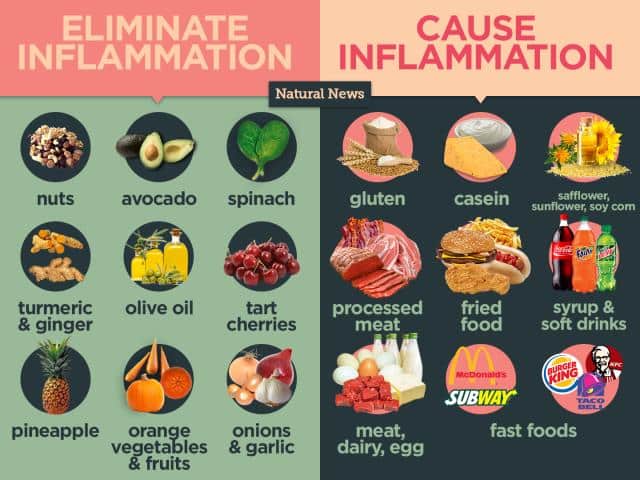 Certain foods you eat can make inflammation worse or better. Your diet affects the amount of arthritis pain and symptoms you have. Food like leafy greens and colorful veggies are anti-inflammatory. The following guide will help you know what to eat, so you can keep your arthritis pain and symptoms to a minimum.
Certain foods you eat can make inflammation worse or better. Your diet affects the amount of arthritis pain and symptoms you have. Food like leafy greens and colorful veggies are anti-inflammatory. The following guide will help you know what to eat, so you can keep your arthritis pain and symptoms to a minimum.
Avoid Processed Foods
Prepackaged meals, snacks, and baked goods contain trans fat to help keep them from spoiling quickly. The trans fat will trigger inflammation, so avoid foods that are labeled as containing partially hydrogenated oils.
Only Eat Small Amounts of Omega-6 Fatty Acids
Omega-6 Fatty Acids are in corn, peanuts, sunflowers, safflowers, and soy oils. Most meats are high in omega-6 fatty acids. When you eat too many omega-6 acids, it can trigger inflammatory chemicals in your body.
Beware Refined Sugar / Sugar Alternatives
Refined sugar is in pastries, chocolate, candy, soda, and even fruit juices. The refined sugar triggers the release of proteins in the body that can cause inflammation. Avoid refined sugar, corn syrup, fructose, sucrose, and maltose. Also some people should avoid sugar alternatives such as aspartame and sucralose which can cause an inflammatory response from the body. Many sodas, gum, sugar-free candy, and low-fat yogurt/pudding contain sugar alternatives.
Red Meat and Fried Foods Cause Inflammation and Other Problems
Most meat is high in saturated fats. Red meat has the highest amount of saturated fats. Saturated fats cause high cholesterol and inflammation. Meats also contain high levels of advanced glycation end products (AGEs) that stimulate inflammation. AGEs are increased when broiling, grilling, roasting, or frying meat. Fried foods, like donuts, french fries, and many others contain trans fats and AGEs.
Beware Refined Carbohydrates (White Flour)
Refined carbohydrates are also refined grains and they can cause a quick burst of glucose into your bloodstream which can cause inflammation. White flour products like white bread, white pasta, and crackers are refined carbohydrates. If you are sensitive to gluten, you may also get joint pain and inflammation when eating wheat products.
Mono-sodium glutamate (MSG) Causes Inflammation
A great deal of Asian food contains MSG, which is an additive that can causes inflammation. MSG can also be found in prepared soups, salad dressings, deli meats, and fast food.
Cheese and High-fat Dairy Are Big Inflammation Triggers
Eat cheese and high-fat dairy sparingly if inflammation causes you major problems. Saturated fats and advanced glycation end products (AGEs) are in most cheese, butter, cream cheese, margarine, and mayonnaise. Fermented dairy products like greek yogurt, are anti-inflammatory for people who are not sensitive to cow’s milk.
Cutting down on these food or eliminating them all together is your best bet, but you can also make some easy changes to cut down on eating food that can cause inflammation. Try cooking with olive oil instead of corn oil and start eating grain bread instead of white bread. Think about what you eat and be inventive. It can be fun and you’ll feel a lot better afterwards!
For persistent pain that is interfering with your daily activities, see a rheumatologist to make the correct diagnosis and begin the proper treatment.
Contact Us (859-331-3100) For More Information to Request an Appointment
—
 About Tristate Arthritis and Rheumatology
About Tristate Arthritis and Rheumatology
Tristate Arthritis and Rheumatology is first and largest Rheumatology practice in the Northern Kentucky area. Founded by Dr. Arthur Kunath in 1986, our rheumatology practice now consists of six doctors who are board certified in both Internal Medicine and Rheumatology and a Physician Assistant. Patients see one doctor (except in emergencies), thereby assuring continuity of care and an individualized doctor-patient atmosphere giving the physician the ability to establish personalized and detailed relationships. Our doctors have received numerous awards, including being listed as “Top Doctors” in Cincinnati Magazine, receiving the Patient’s Choice Award, the Most Compassionate Doctor Award, and the American College of Rheumatology’s “My Doc Rocks” award.
>> Learn More



